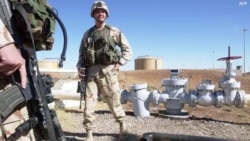On July 19, Russian President Vladimir Putin took journalists' questions after returning from a diplomatic visit to Tehran, where he met with Iranian President Ebrahim Raisi and Turkish President Recep Tayyip Erdogan.
The meetings followed U.S. President Joe Biden’s visit to the Middle East by just a few days and focused on the military and refugee situation in Syria, economics and Russia’s war on Ukraine.
Putin told reporters the three leaders had differences but were united about one thing: the situation in northeast Syria.
“U.S. troops should leave this area. This is the first point. And they should stop looting the Syrian state, the Syrian people, taking their oil illegally,” Putin said.
The claim that U.S. forces are taking Syrian oil illegally is false.
Let’s start in 2014.
A U.S.-led coalition launched a military campaign against forces of the Islamic State terrorist group, which had seized control of parts of northeast Syria and named the city of Raqqa capital of its self-declared “caliphate.”
The anti-IS campaign included airstrikes and providing arms and training to Kurdish-led anti-IS forces that became the Syrian Democratic Forces (SDF). Among the targets of the coalition airstrikes were makeshift oil refineries that IS had established in northeast Syria.
IS earned around $500 million from oil sales in 2016, on top of $360 million from taxation, Reuters reported that year.
U.S. troops were sent into Syria and, in 2019, they killed IS leader Abu Bakr al-Baghdadi in northern Syria. Following al-Baghdadi’s death, the U.S. military reinforced positions around the oil fields. According to then U.S. Defense Secretary Mark Esper, the move was taken to ensure that the oil fields did not benefit IS or the Syrian regime of Bashar al-Assad and its ally, Russia.
Instead, Esper said, revenues from those oil fields would help the SDF arm its troops and guard prisons holding IS detainees: “We want to make sure that SDF does have access to those resources … to assist us with the defeat IS mission."
Shortly before that, then-President Donald Trump had ordered the withdrawal of U.S. troops from northern Syria ahead of a Turkish military operation targeting Kurdish forces, which Turkey regards as a threat.
Trump declared that the U.S. should “keep the oil” its troops had secured in northern Syria – but that never happened. In May 2021, his successor, Joe Biden, elected not to review a waiver Trump had granted allowing a politically connected company operate in the area.
Today, some 900 U.S. troops remain in northern Syria.
Asked in an interview last November about that U.S. troop presence there, Brett McGurk, the Biden administration’s National Security Council Coordinator for the Middle East and North Africa, said that “we intend to stay” in northern Syria to combat IS remnants.
Putin’s claim that the U.S. is stealing Syrian oil echoes Syrian Minister of Economy and Trade Mohammad Samer al-Khalil, who said last October that “oil fields continue to be looted under U.S. supervision and by U.S. companies in northeast Syria and with the cooperation of terrorist groups in the area.” Polygraph.info fact checked al-Khalil then and found his claim to be false.
Syria itself is not a major oil producer. Its reserves account for 0.2% of the world’s total. Syria also ranks 68th among countries in consumption of oil – using 0.1% of total world consumption.
Before Syria’s civil war erupted in 2011, however, oil provided its government with 25% of its revenues. Eleven years of war have devastated the country’s economy.
Russia, meantime, has been after Syria’s oil and natural gas. In 2019, Assad’s government reportedly signed a deal with two Russian companies, Mercury LLC and Velada LLC, covering the production and export of oil and gas in three areas of Syria, including an oilfield in the country’s northeast and a gas field close to Damascus.
Reuters reported at the time that the Assad government was looking “to sign offshore contracts for oil investment,” leaning on its allies Russia and Iran in the face of Western sanctions.
In 2021, Foreign Policy magazine reported that Mercury and Velada had long-standing ties to Putin's confidante Yevgeny Prigozhin. A third Russian company, Kapital, was granted rights to explore and produce gas off Syria’s shores.
In May 2022, to support the continuing efforts to prevent IS from resurging, the U.S. eased sanctions on 12 different economic sectors in parts of Kurdish-controlled northeast Syria and parts of areas controlled by the Turkish-backed rebels in northern and northwestern Syria. The move did not lift oil sector sanctions, however.
In July, the Crisis Group, a Belgium think tank, stated in a study on IS resilience in northeast and central Syria that IS attacks had increased and its revenue had grown.






